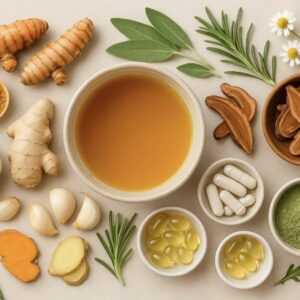Curious about the secrets behind Lion’s Mane mushroom powder’s mystical prowess? Lion’s Mane Mushroom, revered for centuries in traditional medicine, has recently garnered significant attention in scientific research for its potential to enhance cognitive function, support neurological health, and boost the immune system.
Understanding Lion’s Mane: A Closer Look
Lion’s Mane, scientifically known as Hericium Erinaceus, is more than just a funky-looking mushroom. Within its cascading tendrils lies a treasure trove of bioactive compounds, each with its own unique contribution to health and wellness.
NGF: The Brain’s Best Friend
At the heart of Lion’s Mane’s cognitive benefits lies a fascinating compound known as nerve growth factor (NGF). NGF plays a crucial role in the growth, maintenance, and survival of neurons in the brain. By stimulating the production of NGF, Lion’s Mane supports neurogenesis – the formation of new neurons – and enhances neuroplasticity, the brain’s ability to reorganize and adapt. The result? Improved cognitive function, enhanced memory, and sharper focus – all thanks to Lion’s Mane’s remarkable influence on NGF production.
A Gut-Friendly Fungi: Lion’s Mane and Digestive Health
But Lion’s Mane’s benefits extend beyond the brain – it’s also a champion for gut health. Within the gut, Lion’s Mane exerts its effects through several mechanisms, including its ability to modulate inflammation, support the growth of beneficial gut bacteria, and strengthen the intestinal barrier. These actions help soothe gastrointestinal discomfort, promote digestive balance, and support overall gut health.
The Impact of Lion’s Mane on Gut Microbiota
Emerging research suggests that Lion’s Mane may play a crucial role in shaping the composition of the gut microbiota – the trillions of microorganisms that reside in the gastrointestinal tract. By promoting the growth of beneficial bacteria such as Bifidobacterium and Lactobacillus, while inhibiting the growth of harmful pathogens, Lion’s Mane helps maintain a healthy microbial balance. This delicate balance is essential for digestive health, immune function, and overall well-being.
Lion’s Mane and the Immune System
Lion’s Mane mushroom boasts an impressive array of compounds that have been shown to support immune function, making it a formidable ally in bolstering the body’s defences. Research suggests that compounds like polysaccharides and beta-glucans found in Lion’s Mane may help modulate the immune system, enhancing its ability to identify and combat foreign invaders. By stimulating the production of immune cells such as macrophages, T cells, and natural killer cells, Lion’s Mane mushroom helps fortify the body’s natural defences against pathogens and infections. Furthermore, its potent antioxidant properties help reduce oxidative stress and inflammation, contributing to overall immune health.
Harnessing the Power of Lion’s Mane Mushroom Powder
Now that we’ve uncovered the science behind Lion’s Mane, how can you harness its power for yourself? Incorporating Lion’s Mane mushroom powder into your daily routine is easy and convenient. Add it to your morning smoothie, sprinkle it over oatmeal or yoghurt, or mix it into your favourite recipes for a delicious and nutritious boost. With its mild, earthy flavour, Lion’s Mane seamlessly integrates into your culinary creations, making it a versatile and delightful addition to any diet.
Indulge in the rich warmth of this Lion’s Mane Hot Chocolate and awaken your senses to its delicious and health-boosting goodness! maca hot chocolate with lions mane | Go Natural Foods
Embracing the Science of Lion’s Mane
Lion’s Mane mushroom powder offers a wealth of health benefits supported by scientific research. From its ability to enhance cognitive function through the stimulation of NGF to its profound effects on gut health and microbial balance, Lion’s Mane is a true powerhouse of wellness. So why wait? Embrace the science of Lion’s Mane and discover the transformative potential of this remarkable fungi for a healthier, happier you.
References:
1.Thoen, L. F., et al. (2019). Nerve Growth Factor: A Potential Therapeutic Target in Glaucoma? Biomedicines, 7(3), 49.
2.Mori, K., et al. (2009). Improving effects of the mushroom Yamabushitake (Hericium erinaceus) on mild cognitive impairment: a double-blind placebo-controlled clinical trial. Phytotherapy Research, 23(3), 367-372.
3.Zhang, J., et al. (2017). Antioxidant and hepatoprotective effects of intracellular mycelium polysaccharides from Pleurotus geesteranus against oxidative stress in vitro and in vivo. Food and Chemical Toxicology, 107, 139-149.
4.Wong, J. M., et al. (2006). Colonic health: fermentation and short chain fatty acids. Journal of Clinical Gastroenterology, 40(3), 235-243.











